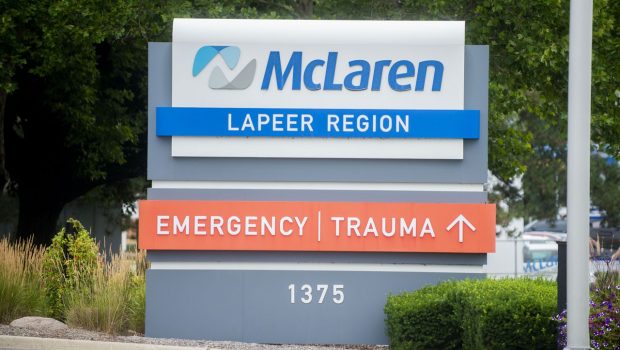Michigan health system using AI technology to monitor chronic conditions
After a successful pilot, McLaren Health Care is expanding a program that uses artificial intelligence technology to monitor patients with persistent conditions.
People living with cardiovascular disease, chronic obstructive pulmonary disease or other lasting medical concerns receive text messages, emails or phone calls – whichever communication they prefer – and must respond to disease-specific lists of automated questions.
Responses indicating signs of complications are digitally flagged and sent to an overseeing nurse.
The aim is to aid people before this situation become critical. “So, helping to identify somebody’s condition is worsening before they present to the hospital,” said Andrea Phillips, director of care coordination for McLaren’s high-performance network. She oversees care management initiatives for the Grand Blanc-based health system.
At a time when hospitals and medical offices across the state are struggling with staffing shortages, this allows one nurse to oversee 1,500 to 1,600 patients instead of 100 to 120. “So, it increases their abilities by about 12 times,” Phillips said.
The health system launched the program in March and in the first few months, more than 1,700 patients were enrolled. The pilot phase ended this summer and McLaren is committed to a permanent program.
Phillips said the hope is to enroll a total of about 7,000 patients.
The will come from across the state, from McLaren Northern Michigan in Petoskey to the Karmanos Cancer Institute in Detroit, and into Ohio, at McLaren St. Luke’s in Maumee, near Toledo.
The program began with COPD and heart failure patients. It is expanding to include those with diabetes, end-stage renal disease and sepsis, McLaren spokesperson David Jones wrote in an email. It could also involve preventative care, such ensuring timely mammograms or prostate cancer screening.
Phillips said the focus is those COPD and heart failure patients as well as those discharged from hospitals with high-risk conditions. “To make sure that once they’re home, they have everything they need, and their issues are addressed so they don’t have to return or get readmitted to the hospital.”
It is early to assess the data, but initial numbers suggest those who are participating in the program are going to the hospital less than those who are not, Phillips said.
Readmission numbers are “significantly down” and anecdotally, patients have said they would have otherwise gone to the emergency department, Jones said.
Feedback has been positive, Phillips said.
“They feel like they are supported, that they have a support person,” she said of patients.
Typically, a nurse will contact them within 90 minutes of a negative response or a request for a call. “So they have that personalized services.”
In contrast, people might be on hold or wait some time to receive a response from a doctor’s office and even longer for an appointment.
Jones sent some patient comments to a reporter. They express gratitude for the monitoring, attentiveness and care. “It’s helped me pay attention and notice how frequently I have breathing issues so I now take my medication better,” one person said in June.
The pandemic exposed and worsened some health care issues in the state and country and exacerbated or accelerated shortages in some fields, including respiratory therapists and nurses – the U.S. Bureau of Labor Statistics projects 194,500 average annual openings for registered nurses from 2020 to 2030, and 23% of hospitals have reported staffing shortages to the government, according to the American Hospital Association.
Additionally, Baby Boomers are aging, and their health care needs are increasing. About 90% of those enrolled in McLaren’s program are older than 65, Phillips estimated.
Health systems are looking for ways to innovate.
“I wouldn’t say health care doesn’t have the resources,” Phillips said. “But how do you work smarter with what you have?”
Read more on MLive:
Can community colleges offer 4-year degrees? GOP lawmaker wants AG to set the record straight.
Michigan primary election results official: 2.1M votes, half were absentee
Judge grants injunction barring county enforcement of Michigan’s abortion ban
Army Corps to nourish private Lake Michigan beaches using federal funds








Gloss